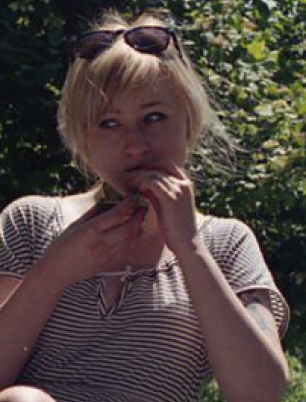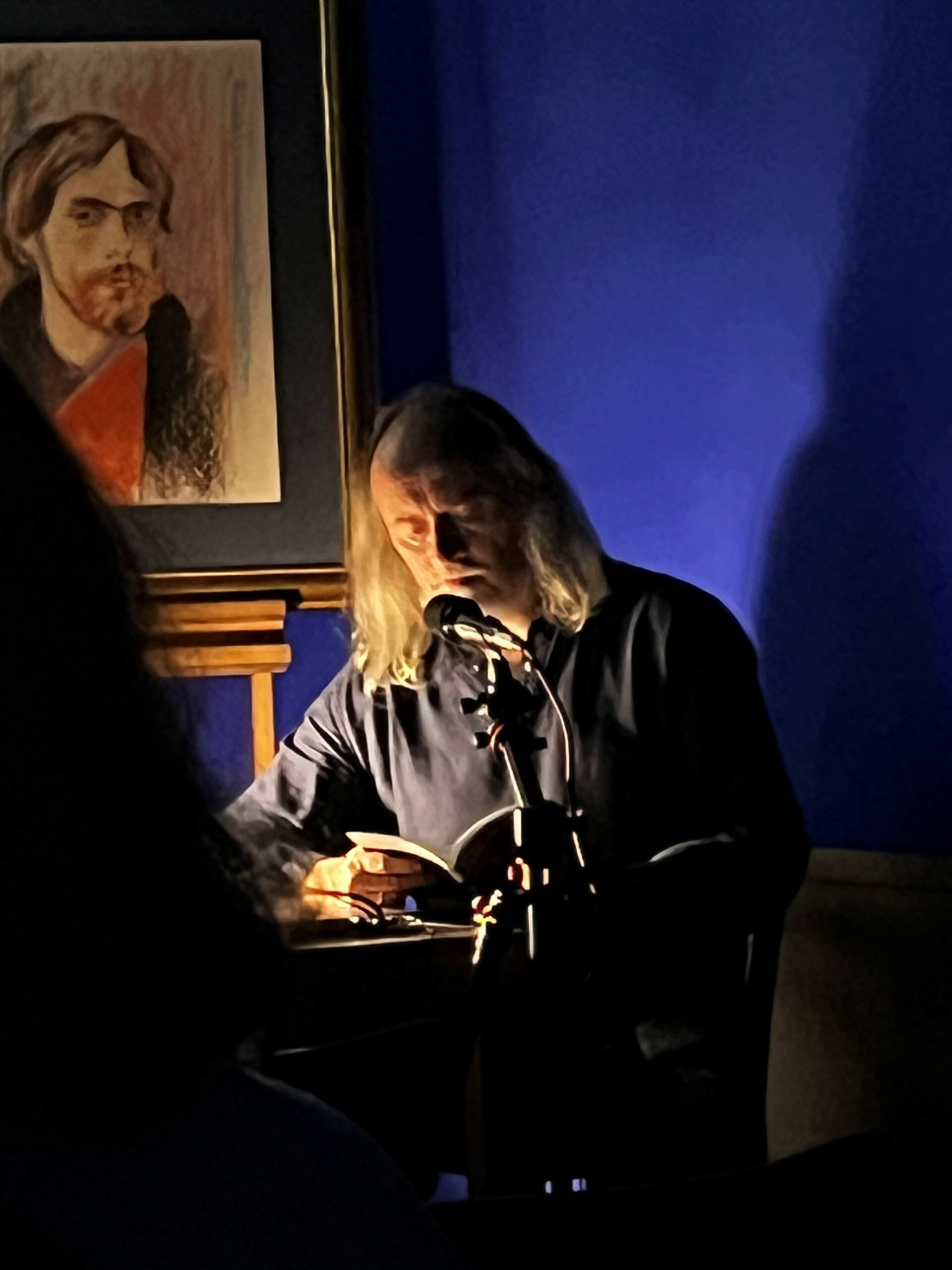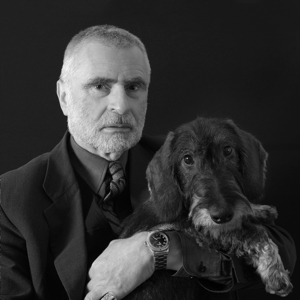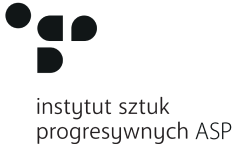born in 1993, graduate of the Faculty of Graphic Arts at the Jan Matejko Academy of Fine Arts in Kraków. She obtained her master’s degree at the Lithography Atelier under the supervision of dr hab. Piotr Panasiewicz. She regularly collaborates with the Jagiellonian University Press, for which she prepares illustrations for scientific books. She is the author of graphic design for volumes such as: Anti-Beatrice and Międzyliteratura jako przestrzeń dialogu (Eng. Interliterature as space for dialogue). She is interested in Japanese and Korean mythology, theories about ancient aliens and cryptozoology. Professionally, she works in illustration, painting, printmaking and tattooing.
.


Alicja Duzel-Bilińska and Grzegorz Biliński (informal art group Alicja and Grzegorz Biliński). Visual artists, stage designers, architects, professors at the Academy of Fine Arts in Kraków. Their main interests and work is located on the borderline of discourse and artistic activities in reference to hybrid space. They focus their activities on new media and space, architecture, urban planning, also as an artistic installation, as well as scenography, exhibitions. They authored several dozen installations.
They have presented their works at home and abroad (United States – Harvard University Cambridge Massachusetts, Salzburg – International Opera Music Festival, as well as the Netherlands, Germany, Italy, Croatia, Romania).
Authors and moderators of 60 radio broadcasts entitled #SZTUKANAUKA on the subject of knowledge consilience, in which both artists and scientists participated, as well as debates concerning the sharing and combining of methodologies of art and science /radio cooperation with M.Horodyski/.
As members of the transdisciplinary research team they found and reactivated the outstanding 1960s robotic artwork SENSTER by E. Ihnatowicz.
Alicia is a member of the Programme Board of the Institute: Somaesthetics And The Arts Center, of which Richard Shusterman is a partner.
Grzegorz is also a supervisor of postgraduate students working in the field of progressive digital arts.
They both co-founded the Institute of Progressive Arts at the Academy of Fine Arts.

Zenon Fajfer – poet, playwright, creator of new literary, theatrical and book forms, together with Katarzyna Bazarnik co-founder of liberature – a genre which combines text and book (Latin liber) into an integral whole.

MA, Polish Language and Literature teacher at the 6th Adam Mickiewicz Secondary School in Kraków.
Her research interests include identity narratives in Generation Y literature, cultural phenomena on YouTube, and the intersections and connections of contemporary literary, media and arts education.


dr hab. Anna Nacher, Professor at the Jagiellonian University. She works at the Institute of Audiovisual Arts at the Jagiellonian University. Her research interests focus on digital culture, studies over the sound, media arts, e-literature, ecological humanities and posthumanism. In the fall semester 2019/20, she delivered courses as a Fulbright Scholar-in-Residence in the Creative Digital Media programme at Winona State University (USA). She has been a guest lecturer at Aarhus University, Aalborg University (Media Arts Cultures Erasmus Mundus programme), UCLA Art|Sci Programe, Washington State University-Vancouver, University of Minnesota. She is the author of three books and numerous articles and chapters in monographs published in Poland and abroad (e.g. in the European Journal of Women’s Studies, Hyperrhiz, communications+1, Kultura Współczesna, Teksty Drugie and in collections published by Routledge, Transcript Verlag or Vernon Press). In 2021 she co-curated an online exhibition of digital art and electronic literature created during the Covid-19 pandemic https://eliterature.org/elo2021/covid in cooperation with Soren Brø Pold (Aarhus University) and Scott Rettberg (University of Bergen), as part of a DARIAH-eu grant.
She is the editor-in-chief of Przegląd Kulturoznawczy, Deputy Chairperson of the Committee on Cultural Sciences of the Polish Academy of Sciences. From 2019, a member of the Board of Directors of the Electronic Literature Organization.
She combines her scientific activity with artistic and ecological activities. Since 1999, she has been a co-founder of the improvised music Magic Carpathians Project, with which she has released over a dozen albums in Poland and abroad, she had two concert tours in the United States and numerous concerts in Poland and Europe. Moreover, she is active in solo projects in field recordings. Since 2020 she has been collaborating with American artist Victoria Vesna (Noise Aquarium Online Meditation, Alien Stardust Online Meditation), in 2021 she was online Artist-in-Residence at UCLA’s Center for the Art Of Performance as part of the project Atmosphere of Sound: Sonic Art In Times of Climate Disruption. Since 2015, with Marek Styczynski, she has been co-leading the bioregional centre Biotop Lechnica in the town of Lechnica, Slovakia, where permaculture workshops are regularly organised.


Polish Language and Literature teacher at the School Complex in Szczekociny and Community Primary School of the 8th Regiment of Lancers of Prince Joseph Poniatowski in Szczekociny. President of the Walenty Zwierkowski Historical and Cultural Association in Lelów. He is the creator and coordinator of educational, social and artistic projects. He has authored lesson plans and Polish Language and Literature projects. He cooperates with the Roman Czernecki Educational Foundation, the Centre for Civic Education, the Forum for Dialogue and the Art Museum in Lodz. He is particularly involved in Jewish themes. Among other things, he co-organises the Szczekocin Jewish Culture Festival and currently the Szczekocin Festival of Dialogue of Cultures and the annual Ciulim-Czulent Festival in Lelów. He is the recipient of the Priest Stanislaw Musiał Award (2014), a distinction in the POLIN Award competition (2016), the Irena Sendler Award “For Repairing the World” (2018), and the Karol Miarka Award (2022). He is the author, editor and co-editor of more than 20 books, including Awangarda w Szczekocinach (Eng. Avant-garde in Szczekociny), Lelów – miejsce, doświadczenie, pamięć (Eng. Lelów – place, experience, memory), Uczymy dalej. Roman Czernecki i jego szkoły w Słupi i Szczekocinach (Eng. We carry on teaching. Roman Czernecki and his schools in Słupia and Szczekociny), Wieża Dawida. Chasydzi lelowscy (Eng. Tower of David. Lelów Hasids).

dr hab. Profesor of the University of Gdańsk. He combines his interests in literary studies (literature of the 20th and 21st centuries) with research on Polish Studies education. Author of numerous academic articles and books: Tadeusz Różewicz wobec niewyrażanego (Eng. Tadeusz Różewicz in the face of the unexpressed) Kraków 2008, Niepoprawny istnieniowiec. Bolesław Leśmian i doświadczenie literatury (Eng. Incorrect existentialist. Bolesław Leśmian and the Experience of Literature), Gdańsk 2019, and Praktykowanie lektury (Eng. Practising reading), Gdańsk 2019. Co-editor of, among others: Sztuka interpretacji. Poezja polska XX i XXI wieku (Eng. Art of Interpretation. Polish poetry of the 20th and 21st centuries), Gdańsk 2014, Adaptacje. Szkolne użycia (anty)teorii literatury (Eng. Adaptations. School uses of (anti)theory of literature), Gdańsk 2018. Editor of the publication series Ponowoczesna dydaktyka polonistyczna (Eng. Postmodern Polish Didactics) (dedicated to the problems of Polish Language and Literature issues at school).
Participation in scientific projects:
Member of the research team in the project of the Institute for Educational Research Didactics of Polish literature and language in upper primary school in the light of the new core curriculum) as part of the ‘Study of the quality and effectiveness of education and institutionalisation of research facilities’ co-financed from the European Social Fund under the Human Capital Operational Programme, Priority III – High quality of the educational system, Measure 3.1 – Modernisation of the system of supervision and management in education, Sub-measure 3.1.1 – Creating conditions for monitoring evaluation and research of the educational system (2012 -2015).
Principal beneficiary in the grant Postmodern Polish Studies didactics. Theory and practice (Pl. Ponowoczesna dydaktyka polonistyczna. Teoria i praktyka) (headed by prof. dr hab. G. Tomaszewska) as part of the National Programme for the Development of the Humanities (2016-2019).

born in 1949 in Kraków. He studied at the Faculty of Painting of the Jan Matejko Academy of Fine Arts in Kraków in the atelier of Professor W. Taranczewski, receiving his diploma with honours and the Rector’s medal in 1973. In the same year, he began teaching at the Academy, receiving the title of Professor in 1992. From 1981 to 1993, he led the drawing atelier, and from 1993 to 2019, the painting atelier; from 1996 to 2002, he was Dean of his alma mater, and from 2008 to 2012, Rector of the Academy of Fine Arts.
He has participated in about 200 exhibitions in Poland and abroad. He has had more than 60 individual exhibitions, e.g. in Kraków, Warsaw, Poznań, Wrocław, Berlin, New York, Prague, Paris, Nuremberg, Essen and Kiev. He has received numerous awards in competitions of painting, drawing, graphics and posters; in 1991 he received the award of the Minister of Culture and Art of the Republic of Poland for outstanding artistic and didactic achievements, and in 2012 the award of the Minister of Culture and National Heritage for his contribution to the development of higher artistic education; the Knight’s Cross Polonia Restituta 2013; the Award of the Malopolska Region “ARS QUAERENDI” 2015; Award of the City of Kraków 2015; Gold Medal “Gloria Artis Medal for Merit to Culture” 2018. In 1981/82 he stayed in the USA on a six-month scholarship from the Kosciuszko Foundation, and he obtained there a scholarship from the Ford & Rockefeller Foundation.
In 2017, he published a volume of memoirs, Moja Akademia (Eng. My Academy).
He is the faithful master of the rough-haired dachshund Felek the Third.
His works are in the collections of: National Museums in Kraków, Warsaw, Poznań, Lublin and Kielce; District Museums in Tarnów and Toruń; Historical Museum of the City of Kraków; Museum of the Academy of Fine Arts in Kraków; Jagiellonian University Museum; Chełm Museum in the town of Chełm; Wyczółkowski Museum in Bydgoszcz; Museum of the Town of Jaworzno; Częstochowa Museum; North Mazovian Museum in Łomża; Historical Museum of the Town of Tarnobrzeg; Poster Museum at Wilanów; collection of the S. I. Witkiewicz “Studio” Art Centre in Warsaw; the Ostromecko collection of the Pomeranian Philharmonic in Bydgoszcz; the collection of the Warmia-Mazury Philharmonic in Olsztyn; the Mazovian Centre for Contemporary Art “Elektrownia” in Radom; the Bank Przemysłowo-Handlowy in Kraków; BWA galleries in Poznań, Sieradz and Białystok; Polish Painting Foundation in Lesko; The New York Public Library; Polish Institute of Arts & Sciences; The Kosciuszko Foundation – New York; Mondriaanhuis museum in Amersfoort in the Netherlands; Fundación Antonio Pérez museum in Cuenca in Spain and private collections at home and abroad.



Coordinator:

Coordinator:

Coordinator:

Coordinator:

Academic Circle of Polish Language and Literature Teaching Methodology at the Jagiellonian University
It is a student organisation operating at the Faculty of Polish Studies at the Jagiellonian University, at the Department of Polish Studies Teacher Training Education. The Circle brings together students of Polish Studies at the Department of Polish Studies Teacher Education, Comparative Studies, Editorial Studies and Anthropological-Cultural Polish Studies, who are getting prepared for the profession of Polish Language and Literature Teachers. It focuses its activities primarily on the organisation of events and meetings aimed at reflecting on particular issues in Polish Language and Literature education. The most important annual event is the International Scholarly Conference “School”, which has been held on 1 June since 2021. In its activities, the Circle cooperates not only with the community of the Faculty of Polish Studies, but also with the Institute of Classical Philology and the Association of Polish Studies graduates affiliated with the Faculty of Polish Studies at the Jagiellonian University.

Scientific Circle of New Space of Interpretation JU
